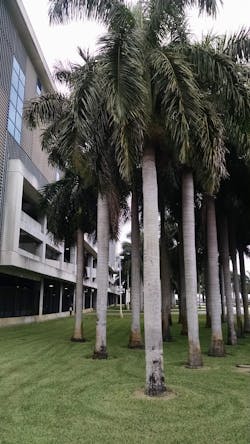Why Fort Lauderdale-Hollywood International Airport Opted For Parksmart Certification
Airports have long understood why smartly-designed buildings and systems that maximize efficiency and minimize environmental impact can boost their bottom line. Several U.S. airports have earned environmentally-focused recognition, such as the U.S. Green Building Council’s (USGBC) LEED certification, for their terminal design and construction innovation. Only recently, however, has one been rewarded for its environmentally sustainable parking efforts. As part of the USGBC’s holistic approach to sustainability in the built environment, it has embraced transportation and parking infrastructure through its Parksmart Certification program. This past May, Broward County’s Fort Lauderdale-Hollywood International Airport (FLL), Florida, was the first airport to be awarded the Parksmart Certification for excellence and efficiency in its parking design and management. FLL has achieved certification for its largest garage and is well on the path to certifying the two remaining garages.
FLL’s certification process offers critical lessons for airports worldwide about applying the Parksmart concepts to their sites and navigating the certification process. As the Consulting Parksmart Advisor to the Fort Lauderdale-Hollywood International Airport, my first-hand account working with Dedrie Registe, Contracts/Grants Administrator of Airport Parking Operations, and her team can help airports and campuses plan for Parksmart Certification.
What is Parksmart?
USGBC Parksmart certification recognizes parking structures that demonstrate advanced environmental sustainability and efficiency in their design, programming and management. It applies to both new and existing buildings and, unlike prescriptive certification systems that focus primarily on the building design and construction, Parksmart also considers facilities’ ongoing operational aspects.
The Parksmart Certification Standard includes 248 available points and to obtain “Pioneer” certification for existing structures a project must score at least 90 points. New structures have different scoring requirements for certification and are tiered to recognize three different levels of sustainability (Gold, Silver, and Bronze).
The Certification Standard considers a wide range of sustainability initiatives. Some of these are commonplace, such as considering whether a facility charges for parking (which reduces demand) and provides pay-on-foot kiosks (which allow for quick exits). Other initiatives are more advanced, such as conducting a life-cycle assessment to determine the environmental impact over the course of a garage’s useful life, or employing energy storage systems such as battery backup, which helps stabilize the electrical grid. The various initiatives enable Parksmart accessibility for a wide range of garages.
Why Parksmart?
The Parksmart process at FLL was initiated by Doug Wolfe, FLL’s Assistant Director and CFO and Dedrie Registe, who were both passionate about sustainability and extending the existing airport-wide priorities into the parking structures. For Registe, securing Parksmart certification was a way to gain recognition for Broward County’s ongoing efforts to make FLL a sustainability and efficiency leader and to promote smart parking across the airport industry.
FLL’s executive management has for many years embraced resource efficiency and sustainability as a way to minimize operating expenses as well as an environmentally beneficial strategy. Long before starting the Parksmart Certification process, FLL had been noteworthy for its attention to design and place-making, and its environmental efficiency practices. Since Broward County, Florida owns the parking structures and contracts with parking operator SP+ for operations and customer management, both SP+ and the airport have consistently prioritized efficiency. Pam Brown, Senior Vice President for airport business development at SP+, enthusiastically endorsed FLL’s Parksmart Certification efforts as “a win-win strategy to increase customer satisfaction, lower operating costs and benefit the environment and local community.” The primary take-away from the FLL and SP+ alignment is that having buy-in from both airport management and the parking operator is a key advantage for airports starting the certification process.
Starting on the Path to Parksmart Certification
Registe’s role was critical as the focal point facilitating connections with personnel throughout the process. She was instrumental in forming the certification team and enabled the on-site SP+ operations group to fully engage in the process. It was important that the key stakeholders strongly supported efficiency and the benefits of environmental sustainability (a healthier environment, lower operating costs, enhanced customer satisfaction), because this energized the team to rally around the Parksmart project.
Certification at FLL began with a site meeting between Two Willows Consulting (Parksmart Advisor), the stakeholders of Broward County (owner of the airport) and SP+ (the parking operator). We ran through the certification elements (called Measures in Parksmart parlance) and gathered as much preliminary information as possible over the course of a couple of days. Since the three garages, Cypress, Hibiscus and Palm, were independent structures, each needed to be independently evaluated and documented.
Assessing Systemic Sustainability at FLL
We inspected each garage to identify which features could potentially earn Parksmart certification points. Many measures require more technical information than can be obtained through visual inspection, but this early inspection provides a reasonable assessment of each garage in its existing state. The sustainability features that made Cypress Garage a certification candidate span the three sections of the certification management, programming, and technology and design.
Placemaking is one of the FLL campus key aspects, including extensive green spaces, picnic areas and tree buffer zones, a decorative blue and white patterned façade on the exterior of Cypress garage, public art displays, aesthetically appealing interior design, an airport observation platform and a pet relief area for furry passengers. Features including a cell phone lot for patrons to wait for arriving passengers without idling at the curb, EV charging stations, in-garage vehicle assistance and a backup power source to avoid using the emergency generator all enhance the client experience while improving efficiency and reducing emissions. Similarly, FLL’s traffic management, including single-space wayfinding for patrons to locate parking spaces, entrances and exits, helps patrons and reduces unnecessary vehicle circling and idling. FLL has also incorporated the State of Florida SunPass toll transponder system into the exit system, along with the more typical pay-on-foot payment kiosks, to further reduce idling from exiting vehicles. Broward County performed an ASHRAE Building Systems Commissioning on the Cypress Garage when it was originally constructed to ensure all of the building systems were working according to their design and operating at peak efficiency.
Once we had an idea of the point range that each garage could potentially receive, we identified a significant number of additional points FLL could seek with modest financial and personnel resources, while providing maximum sustainability benefits. These changes included installing EV charging stations and a tire inflation station, altering some of the operations procedures, installing recycling receptacles throughout the garages, and launching a marketing program to educate patrons about sustainability.
In the end, the airport did not need to invest in large capital improvements to obtain certification. One particularly meaningful activity was airport employee Kadiana Mills’ interest in obtaining her LEED credential (Leadership in Energy and Environmental Design). This active member of the parking team provides sustainability knowledge and can influence day-to-day decisions based on both environmental and financial considerations.
What it Takes to Get Parksmart Certified
The process of preparing for submission involved creating photographic documentation of the garage structures and features, gathering invoices for operational practices, assessing product specifications, writing narratives and pursuing information about the facility. In many cases, this required tracking information from vendors and suppliers outside of the airport personnel.
It was not a difficult process, but for anyone considering Parksmart certification, the best way forward is to designate (or hire) a point person for the role of Parksmart project manager. This project manager is critical to keeping the process moving forward, scheduling regular status meetings, pulling the various documentation pieces together and interfacing with USGBC. Most importantly, it enables parking team members to maintain their focus on their regular job responsibilities with minimal distraction.
What Does Parksmart Mean for Customers?
Customers at FLL can charge their electric vehicles, enjoy some of the excellent placemaking elements and make a reservation for a parking space using their cell phones before arrival. A traveler on a long layover or who’s final destination is Fort Lauderdale can take the free Sun Trolley to the beach or city center. A local resident passing through the garage to retrieve a vehicle can learn about and decide to adopt the energy efficiency strategies highlighted in the educational signage. Drivers arriving at the airport can take advantage of the single-space wayfinding and reservation system, while departing patrons can enjoy a tire inflation and a quick exit thanks to the SunPass transponder or pre-paid parking ticket. Everyone will be reminded of simple changes they can make to reduce their environmental footprint, such as the value of recycling their beverage bottles or the benefits of inflating their tires to achieve peak performance.
Final Thoughts
The features and practices FLL employs are achievable by most airports and I encourage every airport to evaluate its parking system’s sustainability aspects. As the gateway to your city or region, achieving Parksmart Certification for your airport tells patrons and the community that you’re committed to creating environmental and social value.
Individually, most of FLL’s sustainability initiatives are well-known best practices in the parking industry and wouldn’t seem noteworthy on their own. Collectively, however, employing numerous sustainability strategies is a comprehensive and holistic sustainability approach. Pursuing Parksmart Certification can earn you well-deserved recognition for your site’s lighter environmental footprint, bottom line benefits and improved efficiency throughout the parking system.
About the Author

